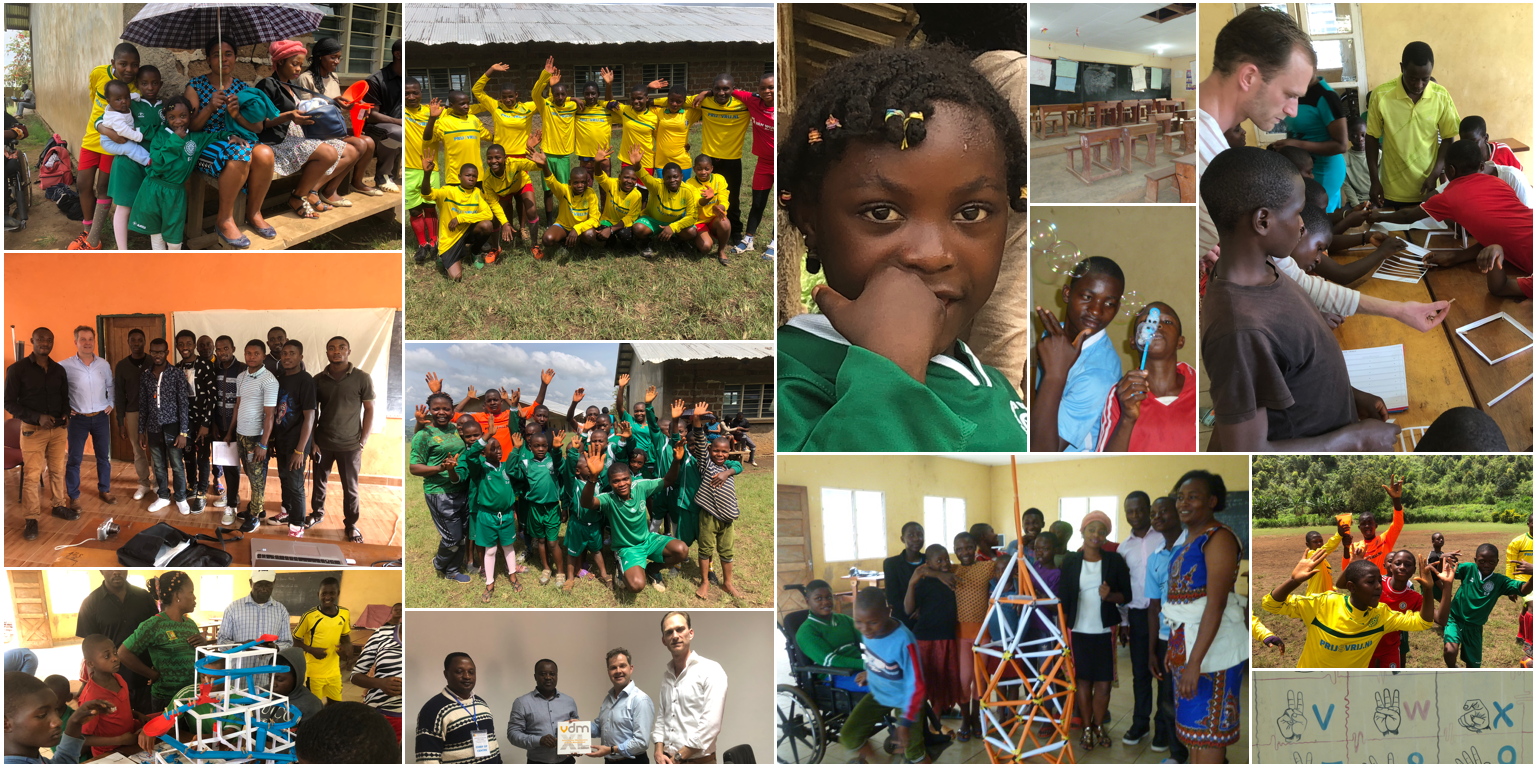Charity project Brains, Hands & Friends
At the end of 2012 Mainnovation decided to share their success with the less fortunate in the world. Our ambition is to do more than just raising money. Our goal is to add value at different levels with the aim of a better future. We want to share our knowledge of maintenance, to build with our bare hands and to inspire our friends and acquaintances to join our charity project “Brains, Hands & Friends”.
Update: ‘Projects started in 2020 and 2021 thanks to the help of Mainnovation’
Mainnovation will focus their charity project on Bamenda in Cameroon. Bamenda is controlled by a formal government and the traditional power groups, the so-called “chefferies” (chiefdoms), headed by a Fon, or king. Fons often have more impact on daily life in Bamenda than the local formal government. Bamenda is one of the largest strongholds of Cameroon’s opposition party, the Social Democratic Front (SDF). Since 1915 (World War I), the residents of the narrow western mountain range where Bamenda is in, speak English. The majority of Cameroon is French-speaking. The English-speaking part is outcasted. The economy of Bamenda consists two-thirds of agriculture, the main source of income. In 1969 about 80% of the population above fourteen years old was illiterate, now it is less than 25%. There are enough hospitals, but to get access you need to have enough money. Bamenda has a wide variety of beliefs, even though people live peacefully together. 96% of the population is cooking on a wood fire, firewood is running out, surface water and groundwater are polluted and native plants die off. There is an urgent need for knowledge and how to use these natural resources sustainable.
Dordrecht, our company headquarters in The Netherlands, and Bamenda are twin towns. The knowledge and experience of the Foundation Dordrecht-Bamenda and the issues in Bamenda play a big role in our choice for this city. With our knowledge and experience we think we can contribute to the sustainable use of Bamenda’s valuable assets. Therefore we are focusing on teaching young people and providing access to education and knowledge.
Brains
In 2013 we started our project and in November, two colleagues went to Cameroon. They gave a guest lecture at the Technical University of Bamenda. Working with the professors, the scope and content of future lectures has been identified and may become part of the regular curriculum. We will provide guest lectures twice a year, returning in the spring of 2014 to present a guest lecture again.
Hands
We found our hands-on project at the “Integrated School for the Deaf Mbingo”, just a couple of miles north of Bamenda. In this school 125 deaf children from all over Cameroon are brought together to learn sign language and to be educated as all other children are in the primary schools. Unfortunately deaf children are often seen as bewitched, rejected by their families and placed outside the community. The deaf institute in Mbingo helps those children to get a better future by teaching them to communicate and therefore they are able to receive a proper education. Mainnovation has decided to support the building of new classrooms at the school to ensure that they can continue to help these children. With the help of Mainnovation a first newly built classroom was taken in use in 2015.
Friends
At Mainnovation we cherish friendship and understanding. We want to provide support both at the Technical University of Bamenda and for the deaf children in Mbingo and that’s where friends come in. Would you like to help the deaf children in Mbingo get a better future? If you would like to help with your experience, resources or financial contributions, please contact us at +31 78 614 67 24 or info@mainnovation.com

Visit Mainnovation April 2018 to Bamenda and Mbingo
After a break of one year, Niels Kuiken and Frank Hoffman traveled to Cameroon for a week. They have visited the National Polytechical University of Bamenda and the deaf school in Mbingo. Niels and Frank are both employed at Mainnovation as a consultant in the field of Maintenance and Asset Management.
As in previous years, the visit is dominated by ‘Brains, Hands and Friends’. At the National Polytechnical Bamenda, Frank and Niels have given two guest lectures with the subject ‘Workflow Management within a maintenance organization’. In addition, they have supervised two interactive workshops with the theme ‘Root Cause Analysis’.
In Mbingo, Niels and Frank had 40 deaf children between the ages of 6 and 16 acquainted with construction and technology through doing and experiencing. The idea was to build towers together with the children. The challenge was to realize this with only simple means such as paper (A4) and adhesive tape.
These activities alternated with more sporting topics such as blowing soap bubbles and a game of football. The result of both days exceeded expectations and brought a lot of enthusiasm and pleasure to both children and supervisors. Frank and Niels look back with great satisfaction to this special meeting in Cameroon.
Projects started in 2020 and 2021 thanks to the help of Mainnovation
At the end of 2020 and also at the end of 2021, Mainnovation was able to contribute to the realization of various projects with a nice donation.
In 2020 the Wil Schrijvershof Scholarship Fund was established to give deaf girls a Scholarship. Due to the war that prevails in the English-speaking part of Cameroon, it is very difficult for parents to pay for education. Eight girls who attend school in Bamenda and seven girls who attend boarding school in Mbingo have been selected for this Scholarship. Thanks to the legacy of Wil Schrijvershof, the donation from Mainnovation and gifts from friends of the Dordrecht-Bamenda Foundation, these deaf girls were given this opportunity for a good future.
With the 2021 donation, the school for the deaf in Mbingo hopes to be able to furnish a classroom with multimedia facilities, for example for online education. In addition, there is a great need for support to bring the children from surrounding villages to school. Also a project has been launched to start a chicken farm and to create a large vegetable garden in order to generate income for the future and to give children skills so that they can add value to the community despite their disability.



Social